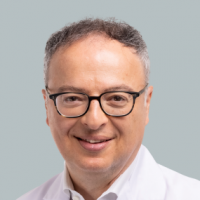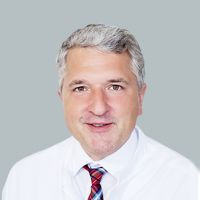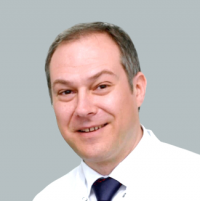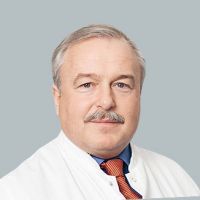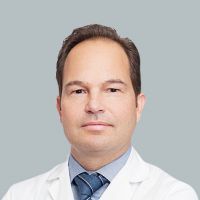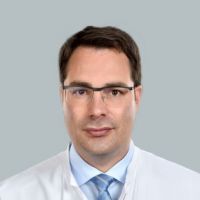Recommended specialists
Article overview
Gastric surgery - Further information
What is the stomach?
The stomach, consisting mainly of muscle cells and gland cells, is an important part of the digestive tract into which the esophagus enters and which merges into the duodenum. In addition to storing and mechanically grinding and mixing the food pulp, it pre-digests the food components and kills bacteria. For this purpose, the glandular cells produce substances such as the enzyme pepsinogen and hydrochloric acid, which split up the proteins, so that they can be completely broken down into their individual components during digestion and then be absorbed into the body. On the other hand, stomach glands also release mucin, a substance that protects the stomach lining from aggressive hydrochloric acid.
Which diseases are treated by gastric surgery specialists?
The stomach can be affected by various diseases, such as stomach ulcers, inflammation of the gastric mucosa (gastritis) or an irritable stomach. Only very few of them require surgical treatment. Over time, however, gastritis can develop into an ulcer disease, resulting in injuries to the mucous membrane of the stomach. If not treated, the mucous membrane defects may extend through the stomach wall into the abdominal cavity. Drug therapy for ulcer disease or a change in lifestyle is not always successful. If the patient is not symptom-free despite therapy or the stomach ulcer does not recede, complications such as bleeding occur or it is suspected that the ulcer is malignant, a surgery by a specialist in gastric surgery is indicated. A very important disease, which practically always requires surgery, is stomach cancer. Other diseases or changes that are often (co-)treated by gastric surgery experts are, for example:
- Gastric lymphoma (also a type of cancer)
- Benign tumors
- Stenoses (constrictions due to scarred healing of stomach ulcers) of the stomach outlet
- Injuries to the stomach (e.g. due to foreign bodies, burns, violence)
- Malformations (e.g. the pyloric stenosis of infancy)
- Twisting of the stomach (Volvulus)
- Diverticulum of the stomach (protrusions of the stomach wall)
- Diaphragmatic hernia, i.e. passage of parts of the stomach through the diaphragm
- Reflux disease (heartburn)
In the case of pathologically obese people, gastric surgery specialists can reduce the size of the stomach or create a gastric bypass.
Which diagnostic methods are used by gastric surgery specialists?
One of the most important procedures for examining stomach complaints is gastroscopy. With the help of a special endoscope, the gastroscope, which is inserted into the stomach via mouth and esophagus, the gastric surgery expert can assess the entire mucous membrane of the stomach. Inflammations, diverticula and ulcers can be detected, tissue samples can be taken (biopsy), foreign bodies can be removed and even minor therapeutic or surgical interventions (e.g. with a laser) can be performed. The tissue samples can then be examined in the laboratory for tumor cells or bacteria (e.g. Helicobacter pylorus, a bacterium that can cause stomach ulcers and ultimately stomach cancer).
Constrictions, such as pyloric stenosis, can be detected by means of X-ray examination using a contrast agent. The X-ray examination provides particularly good results in the case of advanced gastric carcinomas. For tumor diagnostics, ultrasound examination (sonography), computed tomography (CT) and magnetic resonance imaging (MRI) are also used.
With the help of laparoscopy, the abdominal cavity as well as the stomach and other organs or structures can be reliably examined from the outside, and, if necessary, the first therapeutic interventions can be performed.
Which treatment methods belong to the range of services of a gastric surgeon?
Depending on the disease, different treatment methods are available. In addition to its significance for diagnostics, gastroscopy also plays an important role as a therapeutic method. It can be used, for example, to remove foreign bodies and polyps, remove constrictions with the aid of a laser or stop bleeding by inserting special clips, adhesives or medication.
Laparoscopy is also important. With this minimally invasive procedure, a diaphragmatic hernia can be treated (hiatus hernia surgery), broken stomach ulcers can be covered, parts or even the entire stomach can be removed (stomach surgery, stomach reduction), cuffs can be used for the treatment of a reflux disease (antireflux surgery, reflux surgery) or a gastric band can be put on to treat pathological obesity.
In gastric bypass, the stomach is severed and the remaining small residual stomach is connected to the small intestine, which is also severed.
What distinguishes specialists in gastric surgery?
Experts in gastric surgery are often visceral surgeons, i.e. they have completed a specialist training in visceral surgery. That means they are specialists for all surgical procedures in the abdominal cavity, the abdominal wall, the endogenous (inwardly draining) glands and the soft tissues, including transplants. In addition to assessing whether a disease should be treated surgically or conservatively, they also know all endoscopic, laparoscopic and minimally invasive surgical procedures if surgery is required.
However, specialists in internal medicine and gastroenterology can also be specialists in gastric surgery. As a rule, they are the first point of contact for the patient when it comes to performing gastroscopy.
Medical spectrum
Therapies
Diseases
Anatomy
References
- Kirsch J (2017) Magen (Gaster). Duale Reihe Anatomie. Thieme, Stuttgart
- Ott K, Siewert JR, Bumm R (2012) Magen und Duodenum. In: Siewert JR, Stein HJ (Hrsg) Chirurgie. 9. Aufl. Springer, Heidelberg
- Zünd M, Lüdin M, Lange J (2009) Klinikmanual Chirurgie. Springer, Heidelberg




